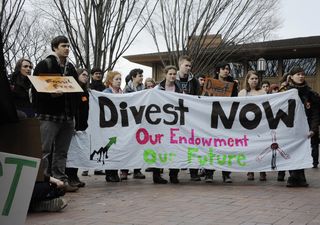Ethics and Morality
The Ethics of Recent Protests on College Campuses
Can campus protest movements embrace important ethical principles?
Posted November 24, 2015

In recent weeks and months, colleges across the country have erupted in protests mostly associated with the Black Lives Matter movement. Some have also recently focused on other issues as well such as divestment. Remarkably, the top leadership at the University Missouri resigned after protests included a hunger strike and threats from the football team that they would refuse to play (which would have cost the university millions). Protests at Yale, Amherst, MIT, Dartmouth, and elsewhere included hard to watch video footage that have gone viral. Certainly, protests on college campuses are nothing new but the recent frequency, intensity, and availability of smartphone videos make these events especially compelling and noteworthy.
Students are embracing important and just causes related to diversity, prejudice, equal opportunities for all, and so forth. But in their enthusiasm for these very important and noble causes they sometimes gravitate towards physical or verbal violence as well as unethical behavior that can undermine the very causes that they wish to promote.
College students, as emerging adults, developmentally struggle with a variety of important maturation tasks including identity formation, independence, and impulse control which all play important roles in the methods that they choose to engage in during campus protests. Protests in an ethical manner must embrace the values and virtues that they seek to highlight and endorse including respect, inclusion, openness to various points of view, compassion, and so forth.
The RRICC model of ethics (i.e., respect, responsibility, integrity, competence, and concern for others that has been discussed in many of my previous blog posts for Psychology Today) can be a helpful tool to discern how best to engage in campus protests. Respecting the rights of all, being true to one’s core values of inclusion, diversity, and so forth, and always being concerned for others (even those who hold different points of view) must be highlighted.
Dartmouth President Phil Hanlon articulated well in his recent letter to the campus community the important balance between free speech and ethical behavior stating, “As one of the great institutions of higher learning, we are committed to the open and energetic exchange of ideas. And as Dartmouth's citizenship pledge reminds us, we must treat each person with dignity and respect.”
Excellent models of protest movements exist. Think Martin Luther King Jr., Cesar Chavez, and Mahatma Gandhi are all provide powerful examples of ethically based and non-violent civil disobedience and protests. Perhaps our current college students might take a page from their playbooks and model themselves in similar ways to assist in righting previous and current wrongs and to do so ethically.
So what do you think?
Copyright 2015 Thomas G. Plante, PhD, ABPP
Check out my web site at www.scu.edu/tplante and follow me on Twitter @ThomasPlante


